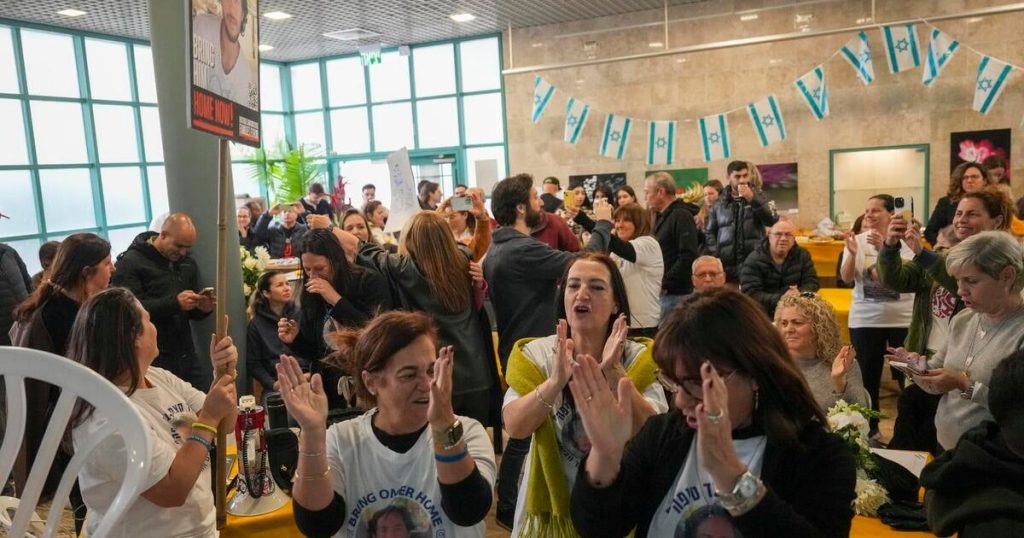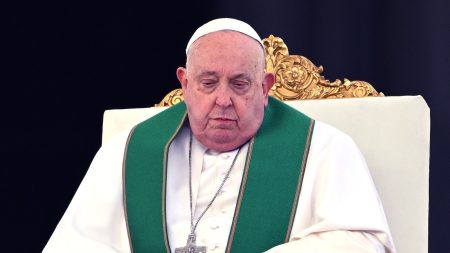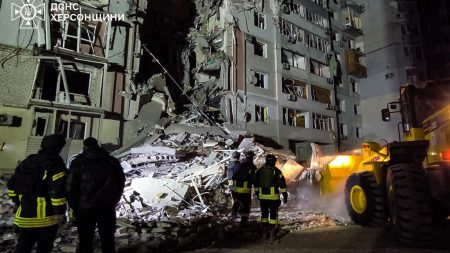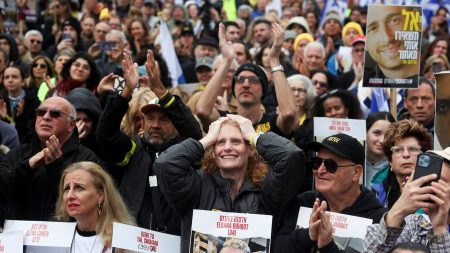Hamas Releases Israeli Hostages Amid Tensions and Uncertainty Over Ceasefire
A Glimmer of Hope: Hostages Return Home Amid Ongoing Conflict
On Saturday, February 22, 2025, Hamas released five of the six Israeli hostages scheduled to be freed as part of a fragile ceasefire deal. The release marked a rare moment of hope in a conflict that has devastated both Israelis and Palestinians for nearly 16 months. Among those freed were three Israeli men—Omer Wenkert, Omer Shem Tov, and Eliya Cohen—who were abducted while attending the Nova music festival in southern Israel during the October 7, 2023, attacks. The attacks, which saw militants cross the border into Israel, triggered a prolonged military campaign in Gaza. Two other hostages, Avera Mengistu and Tal Shoham, were also released earlier in the day. Mengistu, an Ethiopian-Israeli, had been held in Gaza since 2014, while Shoham was taken during the October 7 attacks. A sixth hostage, Hisham Al-Sayed, was expected to be released later in the day.
The release ceremonies, held in Gaza, were deeply symbolic. Masked and armed Hamas fighters brought the hostages onto stages in front of large crowds of Palestinians. Shem Tov, overcome with emotion, kissed one of the fighters on the head and blew kisses to the crowd. The hostages were then handed over to the Red Cross and transferred to Israeli custody. On the Israeli side, families and friends of the freed hostages erupted in joy. Cohen’s loved ones chanted his name, while Shem Tov’s grandmother ululated, screaming, "Omer, my joy! My life!" The Israeli military confirmed that the three men were in their custody and undergo medical assessments.
Emotional Reunions and Calls for a Lasting Resolution
The release of the hostages was met with immense relief and hope. Shoham’s family, who were freed in a November 2023 exchange, issued a statement calling for a comprehensive deal to secure the release of all remaining captives. "There is a window of opportunity; we must not miss it," they said. Mengistu’s family, watching the handover on Israeli media, broke into a traditional Hebrew song, "Here is the Light," marking the first time they had seen him in over a decade. These emotional moments, however, were juxtaposed with the larger uncertainty of the conflict.
The release of the hostages is part of a broader prisoner exchange that saw more than 600 Palestinians jailed in Israel freed. Among them are 50 prisoners serving life sentences, 60 with long sentences, and 445 Palestinians detained since the start of the war in Gaza. While the exchange represents progress, it has also highlighted the deeply entrenched challenges in achieving a lasting peace.
A Painful Dispute: The Case of Shiri Bibas and the Fragility of the Ceasefire
The hostage exchange proceeded despite a harrowing dispute over the remains of Shiri Bibas, an Israeli mother of two young boys who was abducted by militants. Earlier in the week, Hamas handed over what it claimed were her remains, only for Israeli authorities to discover that the body belonged to an unidentified Palestinian woman. The revelation sparked outrage in Israel, with Prime Minister Benjamin Netanyahu vowing to avenge the "cruel and malicious violation." Hamas dismissed the incident as a mistake, but the episode has cast a shadow over the ceasefire deal.
On Friday night, the Palestinian Mujahedeen Brigades, the group believed to have been holding Bibas and her sons, handed over a second body. Bibas’ family confirmed on Saturday morning that the remains were hers, bringing a grim end to their 16-month ordeal. "For 16 months, we sought certainty, and now that it’s here, it brings no comfort, though we hope it marks the beginning of closure," the family said in a statement. The incident has underscored the fragility of the ceasefire, which is set to enter its second phase next week.
The Future of the Ceasefire: Challenges and Uncertainty
The first phase of the ceasefire, which has paused over 15 months of war, is due to end next week. Hamas has pledged to release four more bodies, completing the initial phase of the agreement. If fulfilled, Hamas would retain about 60 hostages, roughly half of whom are believed to be alive. However, negotiations over the second phase of the ceasefire, which would involve the release of dozens more hostages in exchange for a lasting truce and an Israeli withdrawal from Gaza, are expected to be even more fraught.
Hamas has made it clear that it will not release the remaining captives without a permanent ceasefire and a full Israeli withdrawal. Netanyahu, backed by the Trump administration, has vowed to destroy Hamas’ military and governing capabilities while securing the release of all hostages—goals that many observers view as mutually exclusive. The situation is further complicated by a controversial proposal from former U.S. President Donald Trump to remove 2 million Palestinians from Gaza, allowing the U.S. to "own and rebuild" the territory. While Netanyahu has welcomed the idea, it has been met with universal rejection from Palestinians and Arab countries. Trump has since clarified that he would not impose the plan, saying, "I’m just going to sit back and recommend it."
The Human Cost of War: A Glimpse into the Devastation
The conflict in Gaza has exacted a staggering human toll. Israel’s military offensive has killed more than 48,000 Palestinians, according to Gaza’s Health Ministry, with the majority being women and children. Israel claims to have killed over 17,000 militants, though this figure has not been independently verified. The war has also destroyed vast swaths of Gaza, reducing entire neighborhoods to rubble and displacing 90% of the population at its peak. Many families have returned to find their homes in ruins, with little hope of rebuilding.
For Palestinians like Wahiba Muheisen, who lost her husband and three sons in the war, the suffering is immeasurable. "We’ve had enough of war,” she told CBS News, her voice cracking with grief. "I’ve lost so much." On the Israeli side, families of hostages like Yael Alexander, whose son Edan is believed to be the last living American hostage, are grappling with the nightmare of uncertainty. "If suddenly they decided ‘OK, it’s not working, let’s stop and that’s it, no releases of hostages, this will be a disaster for us the families," Alexander said.
Conclusion: A Fragile Path Forward
The release of the hostages and the ongoing ceasefire offer a glimmer of hope in a conflict that has brought immense suffering to both Israelis and Palestinians. However, the road ahead is fraught with challenges. The dispute over Shiri Bibas’ remains, the uncertainty of the ceasefire, and the broader political and military goals of both sides underscore the complexity of the situation. Families of the hostages and victims on both sides continue to advocate for a resolution, but the path to lasting peace remains uncertain.
As the conflict enters a critical phase, the international community is urging restraint and diplomacy. For now, the release of the hostages serves as a reminder of the human cost of war and the enduring hope for reconciliation.















